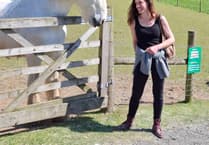A new campaign has been launched to secure the future of TV and radio which is broadcast through an aerial rather than via satellite, cable, the internet and smart speaker.
Research shows 90 per cent of people in the South West want to see continued support for these services.
Digital terrestrial television (DTT) – better known as Freeview – is available to everyone without needing a superfast broadband connection or paying a monthly subscription.
Data from infrastructure company Arqiva, shows that Freeview services are accessed by 53 per cent of people in the South West every week.
The campaign, called Broadcast 2040+ has been launched as the government and regulator Ofcom, make important decisions about the future of broadcast in the UK.
On current plans, there is only certainty of provision for TV and radio through an aerial until the early 2030s. There are a series of upcoming decisions on the long-term future of broadcast services. The first of these will be taking place at the World Radiocommunication Conference (WRC) next year, where countries will decide how much spectrum – radio frequencies used for broadcasting – should be allocated to TV and radio, and how much should be given to other technologies like mobile services.
Decisions at previous WRCs have already led to a reduction in the amount of spectrum allocated to digital terrestrial TV, with services squeezed into fewer and fewer frequency bands.
It comes in the light of the the BBC’s recent announcement in their Mid-Term Charter Review that BBC4, CBBC and Radio 4 Extra will be moved online only.
Research from Broadcast 2040+/IPSO showed that 53 per cent of people in the South West access TV through an aerial every week, 90 per cent of people in the South West want to see continued support for digital terrestrial TV and broadcast radio.
Elderly people, lonely, less well-off and those in rural areas are most reliant on Freeview and radio services – which are available to all.
Broadcast 2040+ campaign has support from Age UK, Silver Voices, the Rural Services Network and the Voice of the Listener & Viewer to secure a commitment from Government on the future of broadcast. People struggling with the cost of living also depend on Freeview. Rising prices have led households to cut back on TV streaming services as people look for ways to save money, with more than half a million subscriptions cancelled for this reason in the first three months of 2022, according to Kantar.
The campaign aims to secure a commitment from Government that DTT and broadcast radio will be safeguarded to 2040 and beyond.
Shuja Khan, Arqiva’s new Chief Executive Officer said:
“Whether it’s having the radio on over breakfast or watching the news during major global events, TV and radio binds us together as families and communities.
“This national asset cannot be taken for granted and I’m proud of the difference broadcast services make to the lives of people up and down the country.
“People in the South West – including the most vulnerable – depend on content that is available to them at all times, no matter where they live, and doesn’t need a subscription or a superfast internet connection.
“That’s why we’re launching the Broadcast 2040+ campaign in coalition with other groups, to give a voice to viewers and listeners and encourage decision-makers to preserve these critical services for the long-term.”





Comments
This article has no comments yet. Be the first to leave a comment.